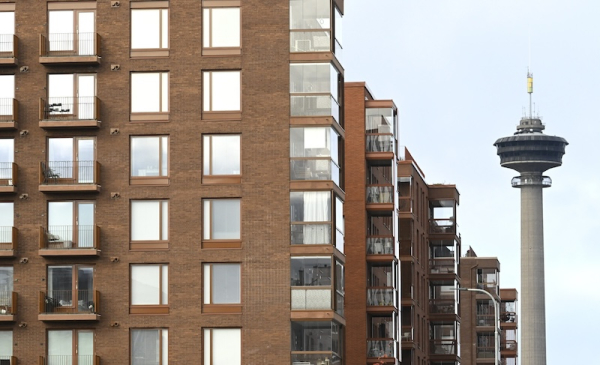
The Ranta-Tampella residential area in Tampere. Housing prices turned upward at the end of the year. LEHTIKUVA
- Next Article Finland and Estonia launch real-time radiation monitoring system
Finland’s housing market faced a difficult start in 2024 but saw a steady recovery in transaction volumes through the year. According to the Finnish Real Estate Federation (KVKL), the number of housing transactions rose in each quarter after hitting a historic low in early 2024.
During the first quarter, only 10,000 used housing units were sold, while sales of new developments fell below 500 units.
KVKL reported that the first quarter marked the weakest performance in its data records since 1999, with January being the slowest month ever recorded.
However, by the year’s final quarter, transaction volumes had grown by 35% compared to the first quarter. Sales of new developments also peaked during this period, signalling an improving market trend. Overall, 50,392 used homes and 2,012 new units were sold in 2024, reflecting a 1% increase in total transactions compared to 2023.
The total value of housing transactions in 2024 was €10.2 billion, up €300 million from 2023. However, this figure remains significantly below the peak value of €18.2 billion recorded in 2021.
Housing prices showed modest declines in 2024, continuing a downward trend since late 2022. The prices of used apartments in high-rise buildings fell by 1.7% in the Helsinki Metropolitan Area and by 0.8% in other major cities compared to the beginning of the year.
While prices in Tampere and Turku rose slightly, by 0.7% and 2.4% respectively, Vantaa and Oulu experienced sharper declines of 6.7% and 7.6%. Detached and row houses saw smaller price reductions, reflecting more balanced supply and demand dynamics compared to apartments.
Longer sales times also characterised the market, as many properties remained overpriced for current conditions.
The holiday home market continued to thrive in 2024, with transaction volumes 15% higher than in 2023. Total sales reached nearly €460 million, an increase of over 16% compared to the previous year.
Demand for holiday homes was particularly strong in late 2024, with prices for these properties remaining elevated compared to pre-pandemic levels. Remote work opportunities and heightened interest in high-quality leisure properties have driven this sustained demand, particularly in regions such as Lapland.
While inflation in Finland slowed significantly in 2024, reaching almost zero, lingering concerns over economic uncertainty continued to weigh on consumer confidence. Rising interest rates in 2022 and 2023 impacted homebuyers’ purchasing power, but interest rates began to ease in mid-2024, providing some relief to mortgage holders.
Tuomas Viljamaa, CEO of KVKL, highlighted the role of policy decisions in shaping the market. He noted that the removal of tax deductions for mortgage interest payments and tighter lending terms have reduced homebuyers’ confidence.
“Restoring confidence in the housing market requires supportive policies, such as extending mortgage repayment periods to 35 years and lowering the transfer tax for home purchases,” Viljamaa said.
The Finnish Real Estate Federation predicts continued recovery in 2025, with transaction volumes expected to grow by 6–9% and housing prices rising by 4–6%. The anticipated market growth is linked to improving economic stability, declining interest rates, and ongoing urbanisation trends that will drive housing demand in regional centres and major cities.
Additionally, increased activity in new construction and renovation projects is expected to support the housing market’s recovery in the second half of 2025. The combination of easing financial pressures and growing demand is likely to set the stage for a return to more stable market cycles.
HT
- Next Article Finland and Estonia launch real-time radiation monitoring system
Source: www.helsinkitimes.fi
